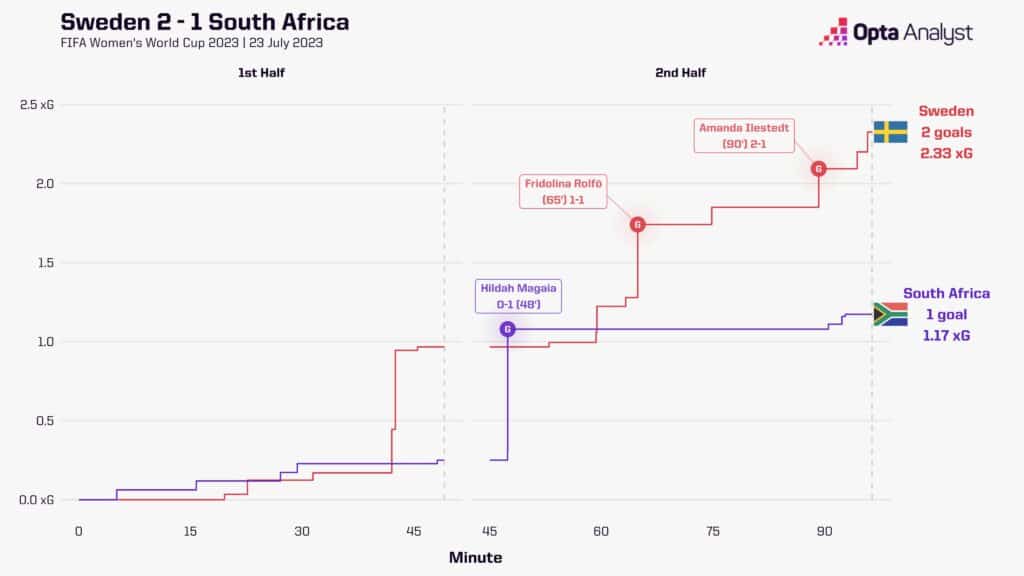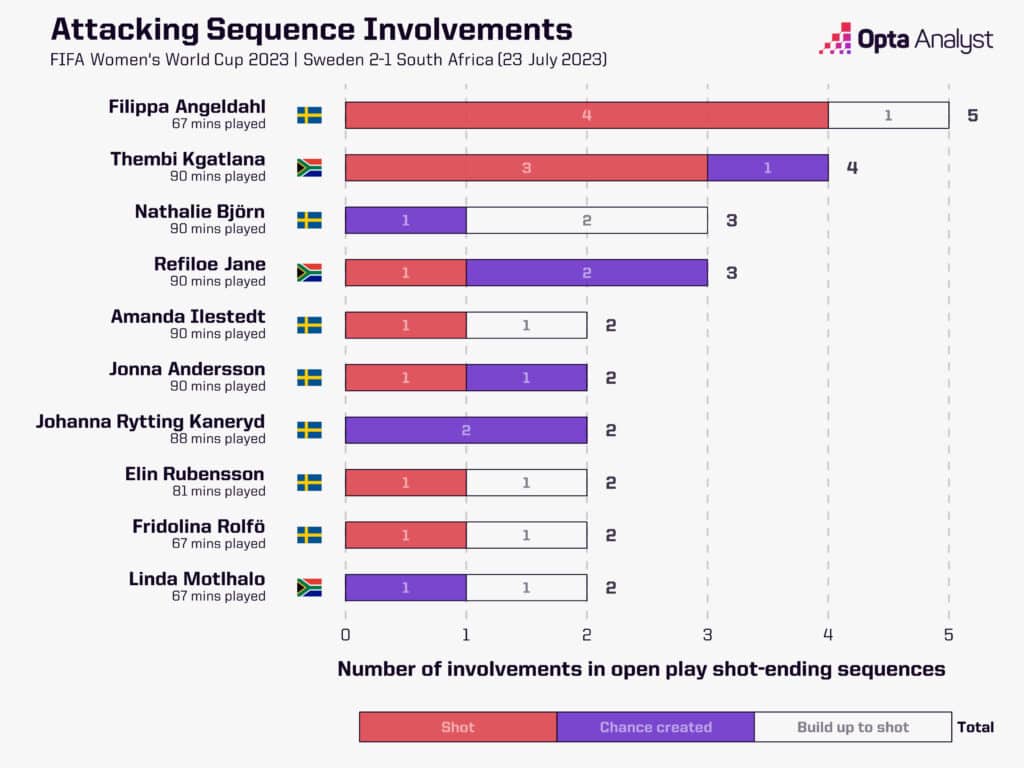
Banyana Banyana came painfully close to securing their first-ever point at a in a 2-1 defeat to Sweden on Sunday morning. Having taken the lead early in the second half, the African champions allowed Sweden to grow into the game, resulting in a 65th-minute equalizer, and a last-minute winner. The game evoked memories of the 2019 opener against Spain. Then, Banyana took the lead in the first half, only to concede an equalizer in the 69th minute and two goals in the final 10 minutes. Yet, despite the same heartbreaking result, the eyes and data point to some improvements in performances. Let’s dig in at Banyana’s World Cup opener.
Possession – The Good & The Bad
“We knew we were going to get chances on the transition…” – Desiree Ellis (post-match)
Coming into the tournament as one of the lowest-ranked sides, and facing the 3rd best in the world, Coach Desiree Ellis clearly imagined a scenario where her team doesn’t see much of the ball in this particular game. Unlike WAFCON where Banyana bossed the ball in almost all their games, the World Cup at present needs more pragmatism.
56% – Banyana’s average possession at WAFCON (2nd highest)
32% – Possession for Banyana in this game, the 4th lowest of all teams so far
39% – Banyana’s average possession at the 2019 WWC (2nd highest)
Going toe-to-toe with a side like Sweden would have been an exercise in self-harm, so there is a case to be made that the tactical setup chosen fitted the occasion. “Let’s give them ball and ground, what matters is what we do with the little possession that we have”. For most of the game, Banyana retained possession well.
10 – average times a team has been dispossessed in this tournament
4 – times Banyana were dispossessed in this game, the fewest of all teams so far
8 – average times Banyana were dispossessed at WC2019, the lowest of all teams
If there is one obvious strength with our Banyana players, it’s their technical abilities. Teams will struggle to get the ball off their feet, and neither can they rely on errors (forced and unforced).
22 – the average number of times a team miscontrolled the ball in this tournament
29 – number of times Banyana miscontrolled the ball on average in 2019, the highest of all sides
14 – number of times Banyana miscontrolled the ball v Sweden, the fewest of all sides
For an hour on Sunday, the plan to sit back, make the most of the little possession we had and break on the counter worked. Less so, the plan to send long balls in behind open defences, as the rainy conditions didn’t favour that approach. Not only does such a plan need smart ball retention, but reading the game and making timely interceptions are also key.
20 – interceptions made by Banyana in this game, the most of all teams so far.
Attacking
The ball possession figure may have remained low (32%), but there are signs that Banyana improved in the outcome of that possession. They were able to create a decent number of scoring chances. In fact, they equalled their 270-minute totals for shots on target and xG from the last World Cup in just 90 minutes.
16 – shots attempted by Banyana in the 2019WWC (all games)
10 – shots attempted by Banyana v Sweden
4 – shots on target by Banyana in the 2019WWC (all games)
4 – shots on target by Banyana v Sweden
1.2 – Total xG for Banyana in the 2019WWC (all games)
1.2 – Total xG for Banyana v Sweden
The Loss Of Momentum
Despite improvements on the attacking front, the technical team should be looking at how the team lost momentum after taking the lead. Once again, the plan to sit back and not be overzealous can not be faulted. But as the first 60 minutes showed, you still need an outlet (by counterattack or long ball) to keep high-possession teams at bay. Sweden kept probing and probing, and it was only a matter of time before they found a way.
8 – shots for Banyana in the first 50 minutes (compared to 7 for Sweden)
0 – shots for Banyana from 51-89 minutes (compared to 7 for Sweden)
The rolling xG timeline shows how Banyana plateaued after scoring the goal, barely creating much. It was only in added time that that xG timeline goes slightly up, but even then these were desperate efforts and the Scandinavians were out of sight. The average shot distance of 20 meters (the longest in the tournament) echoes that desperation.

Sweden’s Height Advantage
The height advantage that Sweden enjoyed over Banyana was clear for all to see, but outside the corners (when given space and time to time their jumps), Banyana actually did well.
23 – Aerials duels contested by the two sides
12 – Aerials duels won by Sweden
11 – Aerials duels won by Banyana
Sweden resorted to set pieces for the majority of their chances. It’s the corner situations that caused a lot of problems, but even then we successfully (if chaotically) defended these for 89 minutes.
12 – inswinging corners faced by Banyana v Sweden in this game
10 – inswinging corners faced by Banyana in three games at the 2019 World Cup.
Players
Thembi Kgatlana was the central striker on the day and was unsurprisingly involved in the most attacking sequences of any Banyana player (4). These included three shots and one chance created. The Swedes knew of her danger, and she was often overwhelmed and pressed by multiple opponents when she had possession. As such, other players also had to step in on the shot counts and the variety of shooters showed that there was a decent Plan B.
7 – players taking shots in this game, the most for a Banyana game at a World Cup
4 – players that took shots in each of the three matches in 2019
10 – players that took shots in the entire 2019 tournament.

It was the first game of the tournament (and probably the hardest, but the technical team can be proud of the effort. The games against Italy & Argentina may play out differently, but there are green shoots upon which Coach Ellis and co. can build upon from Matchday 1.




















